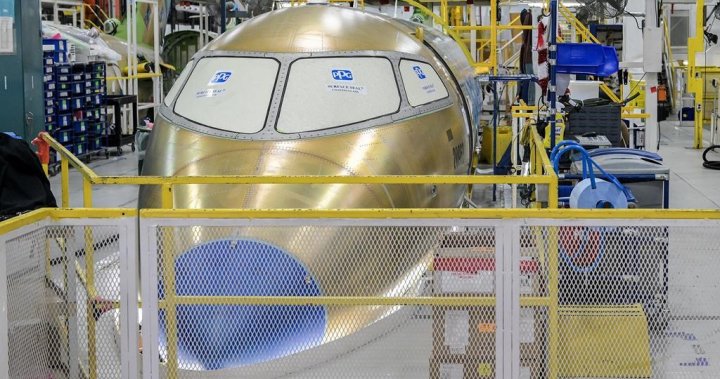Bombardier, a Canadian planemaker, announced that they received an exemption from Canadian sanctions on Russian titanium, following in the footsteps of Airbus who also received a waiver. This exemption comes as part of a package of sanctions imposed by Canada to mark the second anniversary of Russia’s invasion of Ukraine. VSMPO-AVISMA, a company banned by Canada for its ties to Russia’s military-industrial complex, has been a critical supplier of titanium, which is highly valued for its strength-to-weight ratio, particularly in the aerospace industry. Bombardier, now solely focused on manufacturing business jets, no longer directly purchases Russian titanium. However, some of its suppliers do, necessitating the need for an exemption.
Despite criticism from Ukraine’s ambassador to Canada, Foreign Affairs Minister Melanie Joly defended the waiver decisions by stating that protecting jobs in Canada was a crucial factor. This move by Canada to partially reverse the titanium ban for a limited time has caused surprise among other Western aerospace nations. The Canadian government has made it clear to companies that they must seek alternative sources of titanium. The exemptions granted so far only apply to the aerospace sector, including the military, and are only valid for a limited period. Airbus has argued that banning Russian titanium would negatively impact the aerospace industry while having minimal impact on Moscow. CEO Guillaume Faury emphasized that Airbus and other companies have obtained Canadian approvals to continue sourcing the small amount of titanium they still require.
The titanium row has overshadowed positive news for Bombardier, as strong orders for their jets led to a 9% increase in their shares. Orders in the first quarter rose by 60%, resulting in a backlog of $14.9 billion. However, like other companies in the industry facing supply chain challenges, Bombardier had higher cash burn than expected due to increased production and inventory levels. Despite this, the company remains optimistic about the future, ramping up production of their Challenger jets and planning to expand manufacturing of their Global aircraft in 2024. Bombardier faces competition from General Dynamics’ Gulfstream, which recently received certification for their luxury G700 jet. In the first quarter, Bombardier reported 20 deliveries, slightly down from the same period last year, but remains on track to deliver 150-155 jets by the end of the year.
In Europe, Airbus and other companies have expressed their concerns regarding the impact of banning Russian titanium on the aerospace industry. Faury highlighted that the Western aviation industry has significantly reduced its reliance on Russian titanium but still requires a certain amount for production. He also mentioned that other Western countries have taken a different approach to the titanium sanctions policy, aligning with their own needs and beliefs. While Faury does not see the exemptions granted by Canada as a breach of Western unity, he hopes for continued understanding from other countries. The Canadian government’s decision to grant exemptions has prompted discussions behind the scenes with various capitals. The focus remains on ensuring that companies find alternative sources of titanium while upholding sanctions against Russia’s military-industrial complex.
The Canadian government’s decision to grant exemptions for aerospace companies to continue sourcing Russian titanium has stirred controversy and discussions within the industry. Despite criticisms from various quarters, including from Ukraine, Canada has defended its waiver decisions, citing the need to protect domestic jobs. The exemptions, valid for a limited time, apply only to the aerospace sector, including the military, and have raised questions about unity within the Western aerospace industry regarding sanctions policies. Bombardier, amidst the titanium row, reported a strong set of orders in the first quarter, boosting their backlog and share prices. However, like other companies in the sector, they faced challenges related to cash burn and supply chain issues. The future looks positive for Bombardier as they plan to expand production and address competition from other manufacturers in the industry.


